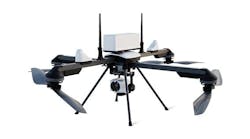July 06--Joe Vaughn took his camera-equipped drone and went to town, hovering it near a topless Lisa Pleiss.
Pleiss was alarmed. The police were called.
And now Vaughn is worried not only about a $10,000 fine but also the future of his business. He's in the spotlight with a frenzy of headlines concerning high-tech "peeping toms," and also in a drone no man's land, a frontier not yet fully understood.
As drones -- officially known as unmanned aerial vehicles -- become less expensive and more available, businesses are steadily incorporating them into real-estate and film ventures.
That's despite the Federal Aviation Administration having a standing blanket policy -- arguably outdated -- banning their commercial use. The FAA's policy allows drones only recreationally, when flown below 400 feet and away from populated areas.
But that policy is being contested after a judge in March ruled the FAA had no authority over small unmanned aircraft. The FAA has appealed.
Vaughn's drone was hovering last month outside the window of Pleiss' bedroom in a downtown Seattle high rise taking panoramic pictures for a developer -- not of Pleiss topless. Vaughn didn't break any known local or state laws. After all, this is the first known complaint about a drone received by the Seattle Police Department, said spokesman Drew Fowler.
Yet the FAA could send Vaughn a cease-and-desist letter or try to fine him, according to Ryan Calo, a law professor at the University of Washington who has testified before the U.S. Senate on the domestic use of drones. How enforceable either of those actions would be will be decided by the court.
The line separating the use of drones recreationally and commercially was drawn in the early 1980s, according to Matt Waite, founder of the Drone Journalism Lab at the College of Journalism and Mass Communications at University of Nebraska-Lincoln. That's back when the rule applied essentially to remote-controlled airplanes, which were almost exclusively a hobbyist's venture.
The FAA has in its policy a Certificate of Waiver or Authorization for commercial use over land, but Waite said there's no clear path for Vaughn or others to apply for or receive one. The FAA is working on a new proposed rule for smaller drones -- which might apply to Vaughn's drones -- due by the end of this year, he said.
The FAA has granted only a handful of waivers. The first was to British Petroleum for drone use in Alaska last month. BP, however, was aided by working with AeroVironment, a certified U.S. Department of Defense vendor.
"The options are to operate in the shadows and face the risk of fines and subpoenas, or find another line of work," Waite said of businesses like Vaughn's.
Vaughn invested his livelihood into his startup business and said he takes precautions when flying his drones, such as flying on the weekends, away from people, and using pilots with more than 20 years of remote-control flying experience.
"I think it's irresponsible of the FAA to take their ball and go home and just ground every piece of equipment," Vaughn said. "Make me get a license. I would love to. I would be the first in line to get one, but you can't ground an entire industry because you can't come up with a set of rules."
Vaughn, who launched his Portland-based aerial-photography company, Skyris Imaging, in 2012, said he was aware of the policy but called the FAA's regional office in Portland to be transparent about his new business.
He first spoke with Karola Crothers, a technical secretary. Her response: "Go to town."
Vaughn said he calls Crothers every six months or so to check in with the FAA. November 2013 was the last time Vaughn called.
"Laws change all the time," Crothers said in an interview. "The first time he did call me there were no restrictions on that. I haven't heard from him in a long time."
Crothers' supervisor, Richard Davis, declined to comment on Crothers' role in the office and whether giving approval for drone use is part of her job. It's possible that Crothers was given wrong information, said FAA spokesman Allen Kenitzer. He said the FAA is investigating the incident.
Colleen Wright: 206-464-2240 or [email protected]. On Twitter @Colleen_Wright
Copyright 2014 - The Seattle Times

